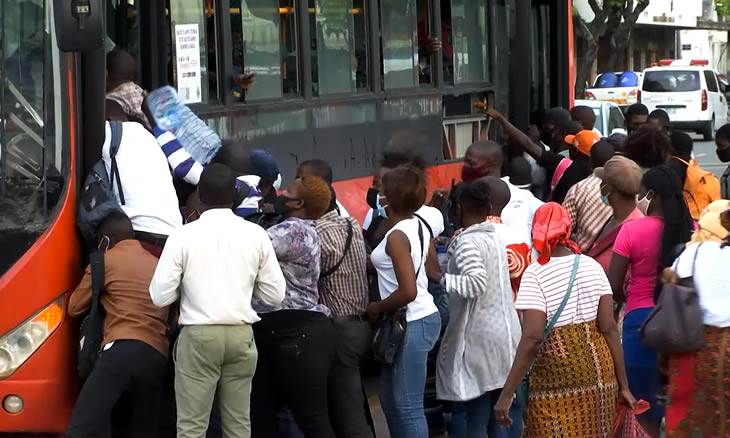Mozambique: Over 100 motorcycles seized in Nacala
Maputo: The ordeal of public transport, the queues, the ligações and all the rest – O País

Photo: O País
Access to passenger transport in Mozambique, particularly in Maputo city, remains an ordeal. At bus terminals and stops, long queues persist, and people wait for hours for a bus. Transport capacity remains far from adequate.
Driving the Praça dos Combatentes-Museu route, Joaquim Taimo stops his bus at the Xiquelene terminal, where passengers are waiting. Before long, the vehicle is full. Taimo points out that the situation is more difficult at rush hours. “In the early hours, there is always a lack of buses, in the morning as well as in the afternoon, and there are a lot of passengers,” he says.
And, in fact, it is at the rush hour when everything gets complicated. In the mornings, for example, everyone looks for transport to the various destinations at the same time.
Almeida António found himself in trouble with the Municipal Police because he entered the terminal already carrying passengers. These are the famous route shortenings and ‘connections’ [ligações] to which passengers are regularly subjected.
The driver explains: “What happens is, for those of us who come from the city, people get on the bus at Saul and don’t get off – they make ‘ligações’ all the way to here at the terminal.”
But his explanation did not convince the Municipal Police officer, who ordered the passengers to disembark so that those waiting in the queue could board.
In the same queue was a disabled man who was almost engulfed by the crowd while trying to board the minibus, which is not equipped to accommodate people with disabilities. But he won his battle, and ended up boarding successfully.
It is like this every day, and users deplore the current situation of transport in the country’s capital.
It is a scenario exacerbated by the recent rise in fuel prices, which leaves operators with little room to manoeuvre. “It is difficult, we have no alternative. We go to work, but we are in a tight spot,” drivers told ‘O País’.
President of the Mozambican Federation of Road Transport Associations (FEMATRO) Castigo Nhamane even says that, at this time, he does not recommend increasing fares, because if that happens, it will not be above two meticais, and will still not guarantee sufficient transport in the coming days.
“In the coming days, the lack of transport may even increase, because some operators may lose the ability to send the minibuses out. Once this happens, and they park them up, the shortage of transport will be noticed,” Nhamane cautions.
Actually, one doesn’t have to wait that long: the shortage of transport is already clearly noticeable. Citizens wait for a long time and the transport, when it arrives, is insufficient for demand. Mira Aly saw her schedule compromised because transport was late. “This situation is unbearable. Just take a look at the queue. It’s long, and there is a shortage of capacity.”
But there was a happy ending for Mira Aly, at least, who managed to board and settle in, a twist of fortune not everyone enjoyed. At the Zimpeto bus terminal, even after 8:00 a.m., there were still huge queues, with many passengers effectively ‘grounded’.
FEMATRO advocates a change of approach in the transport sector, suggesting that the government should stop buying buses, leaving that responsibility to the operators themselves, and that, to reduce costs, it sets up subsidised parts and accessories stores.
“The government spends its life buying buses, but five or six years later, they’re no longer running. Operators don’t have the money to buy buses, so the state has to buy them again, because it wants to see its people being transported. We don’t think it should be like this,” the FEMATRO president says.
The Maputo Metropolitan Transport Agency promised to comment on the transport problem this Thursday, particularly on the 80 gas-powered buses recently acquired by the government.
By Amandio Borges












Leave a Reply
Be the First to Comment!
You must be logged in to post a comment.
You must be logged in to post a comment.